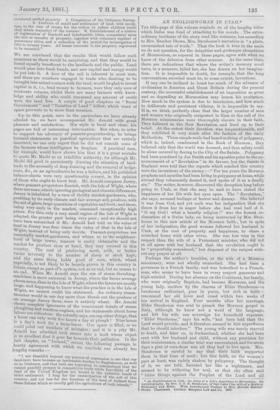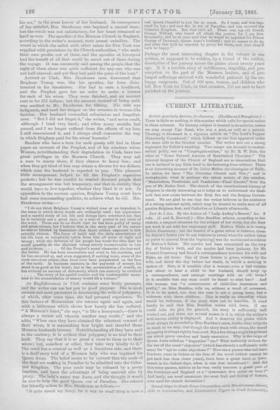AN ENGLISHWOMAN IN UTAH.*
THE title-page of this volume reminds us of the lengthy titles which Defoe was fond of attaching to his novels.. The extra- ordinary incidents of the story read like romance, but according to Mrs. Beecher Stowe, Mrs, Stenhouse's narrative is "a plain, unvarnished tale of truth." That the book is true in the main we do not question, for the iniquities and grotesque absurdities of Mormonism, as exposed in these pages, agree with what we
know of the delusion from other sources. At the same time, there are indications that where the writer's memory must have, in a measure, failed her, she has drawn on her imagina- tion. It is impossible to doubt, for example, that the long conversations recorded must be, to some extent, inventions.
If any one be inclined to boast too much of the advance of civilisation in America and Great Britain dariug the present century, the successful establishment of an imposition so gross and so degrading as Mormonism may lesson his exultation. How much in the system is due to fanaticism, and how much to deliberate and persistent villainy, it is impossible to say. It is, we think, perfectly clear that the larger number of men and women who originally emigrated to Zion at the call of the Mormon missionaries were thoroughly sincere in their faith. They believed in the New Revelation, and lived up to their belief. At the outset their devotion was unquestionable, and they exhibited it very much after the fashion of the early Methodists. These simple souls had heard nothing of polygamy, which is, indeed, condemned in the Book of Mormon ; they believed only that the world was doomed, and that safety could be alone secured by fleeing to the City of the Saints. Polygamy had been practised by Joe Smith and his apostles prior to the an- nouncement of a" Revelation" in its favour, but the Saints in England were told that the reports which reached. this country were the inventions of the enemy :—" For ten years the Mormon prophets and apostles had been living in polygamy at home, while abroad they vehemently denied it, and spoke of it as a deadly sin." The writer, however, discovered the deception long before going to Utah, so that she may be said to have risked. the happiness of her life with her eyes open. The " Revelation," she says, aroused feelings of horror and dismay. She believed. it was from God, and yet such was her indignation that she threw it from her in auger before she had read half of it. " 0 my God I what a beastly religion !" was the honest ex- clamation of a Swiss lady, on being instructed by Mrs. Sten- house in this new article of the Mormon faith ; but in spite of her indignation, the good woman followed. her husband. to Utah, at the cost of property and happiness, to share a wretched home with other wives. She was less wise in this respect than the wife of a Protestant minister, who did not at all agree with her husband that the revelation ought to be "prayerfully considered," but disposed of the subject with- out any prayer at all.
Perhaps the author's troubles, as the wife of a Mormon missionary, were not wholly unmerited. She had been a governess in a French family, and was betrothed to a French- man, who seems to have been in every respect generous and
high-minded. During her absence on the Continent, her family, who were originally Baptists, had become Mormons, and the young lady, smitten by the charms of Elder Stenhouse—a handsome enthusiast, poor in purse, but rich in faith— renounced her old lover and creed within two weeks of her arrival in England. Four months after her marriage, Elder Stonhouse was sent to preach the Mormon gospel iu Italy, although he knew not a word of the language, and left his wife one sovereign for household. expenses. "Elder Stenhouse," says his wife, "had been told. that the Lord would provide, and it therefore seemed to him superfluous that he should interfere." The young wife was nearly starved. to death, and later on, in Switzerland, whither she had been seat with her husband. and child, without any provision for their maintenance, a similar trial was encountered, and for seven days a pint of corn-flour was all they had to live upon. Mrs. Stenhouse is careful to say that their faith supported. them in that time of need ; but this faith, on the woman's part at least, was rudely shaken by polygamy. The thought of it, we are told, haunted her like a nightmare, and seemed. to be withering her soul, so that she often said " bitter things against the Prophet, of nu' Lord and all • An Engliminoomon in Utah : the Story of a Lale's Experience in Alamo:mien'. An Autobiography. By Mrs. T. B. H. Studious°, of Galt Lake City, wife of a Mormon Missionary and Elder. With Introductory Preface by Mrs. Llorriet Beecher Stowe. illustrated. London: Sampson Low and Co. 1850. his sex," to the great horror of her husband. In consequence of her unbelief, Mrs. Stenhouse was baptised a second time ; but the result was not satisfactory, for her heart remained as hard as ever, The apostles of the Mormon Church in England, according to the writer's account, were arrant swindlers. The vessel in which she sailed with other saints for New York was supplied with provisions by the Church authorities, " who made their own profits out of them, and the apostles at Liverpool had the benefit of all that could be saved out of them during the voyage. It was commonly said among the people that the sight of them alone was quite sufficient for any one who was not half-starved; and yet they had paid the price of the best." Arrived at Utah, Mrs. Stenhouse soon discovered that Brigham Young was, like his apostles, far from disin- terested in his fanaticism. She had to earn a livelihood, and the Prophet gave her an order to make a bonnet for each of his wives. They were finished, and an account sent in for 275 dollars ; but the amount, instead. of being paid, was credited to, Mr. Stenhouse for tithing. His wife was indignant, and used her tongue on the occasion in woman-like fashion. Her husband counselled submission and forgetful- ness. "But I did not forget it," she writes, "and never could, although I tried very hard ; and when many months had passed, and I no longer suffered from the effects of my loss, I still remembered it, and I always shall remember the way in which Brigham paid for his wives' bonnets."
Readers who have a turn for such gossip will find in these pages an account of the Prophet, and of his nineteen wives. Women, notwithstanding their degradation in Utah, have two great privileges in the Mormon Church. They may ask a man to marry them, if they chance to fancy him; and when they get tired of him may obtain a divorce for ten dollars, which sum the husband. is expected to pay. This pleasant little arrangement helped. to fill the Prophet's capacious pockets ; but he was careful to remind divorced people that the arrangement was but temporary, and that in eternity they would have to live together, whether they liked it or not. In opposition to the current opinion, Brigham Young must have had some commanding qualities, to achieve what lie did. Mrs. Stenhouse writes :—
" I do not think Brigham Young a wicked man or an impostor, in the sense in which these words are ordinarily used ; but experience and a careful study of his life and doings have convinced me that he is certainly not a great man, or a man of genius in any sense of the word. There can be no doubt that he has been guilty of many and great crimes, but I believe that in the early part of his career be was so blinded by fanaticism that those crimes appeared to him actually virtues. The force of habit and the daily associations of his life have so completely taken from him all souse of right and wrong; while the devotion of his people has made the idea that he could possibly do the slightest wrong utterly inconceivable to him
and to them Of the Prophet's moral character, the less said the bettor. He has been remorseless and cruel in his enmities, and he has connived at, and even suggested, if nothing more, some of the most atrocious crimes that have ever been perpetrated on the face of the earth. In business matters, in the payment of money, his word is as good as his bond ; but in the accumulation of wealth, he has evinced an amount of dishonesty which can scarcely be credited
The story of his sordid avarice and his contemptible mean- ness in the accumulation of money would fill a volume."
An Englishwoman in. Utah contains some lively passages, and the writer can use her pen to good purpose. She is most earnest and most persistent in denouncing the evils of polygamy, of which, after some time, she had personal experience. To this feature of Mormonism she returns again and again, and with a bitterness which shows how keenly she has suffered, "A Mormon's heart," she says, " is like a honeycomb,—there is always a vacant cell wherein another may nestle ;" and she adds, " When once they have obtained the reluctant consent of their wives, it is astonishing how bright and cheerful these Mormon husbands become. Notwithstanding all they have said to the contrary, it is evident that polygamy is no trial to their faith. They say that it is as great a cross to them as to their wives ; hut, somehow or other, they take very kindly to it." The creed has a comical as well as a licentious side, and there is a droll story told of a Mormon lady who was baptised. for Queen Anne. The belief seems to be current that the souls of the dead are waiting in Paradise to be admitted into the Celes- tial Kingdom. The poor souls may be released by a proxy baptism, and have the advantage of being married also by proxy. The lady's name was Anne, and she thought it would be nice to help the good Queen out of Paradise. She related her friendly action to Mrs. Steuhouse as follows :— "It quite struck my fancy, for it was no small thing to have a real Queen thankful to you for so much, So I wont, and was bap- tised for her ; and now sho is out of Paradise, and has entered the Celestial Kingdom. But that isn't all. • There was my old friend, George Wilford, who heard all about the matter, for I see him frequently, and he at once said that ho would be baptised for Prince George of Denmark, Queen Aune's husband ; and he means to do so, and after that he'll be married by proxy for them, and. then
both be happy."
Perhaps the most interesting chapter in the volume is one written, or Supposed to be written, by a friend of the author, descriptive of her journey across the plains about twenty years ago. It is a terrible story of indifference, stupidity, and pre- sumption on the part of the Mormon leaders, and of pro- longed sufferings endured, with wonderful patience by the un- happy emigrants. Out of 600 men, women, and children who
left New York for Utah, on that occasion, 150 are said- to have perished on the journey.



































 Previous page
Previous page